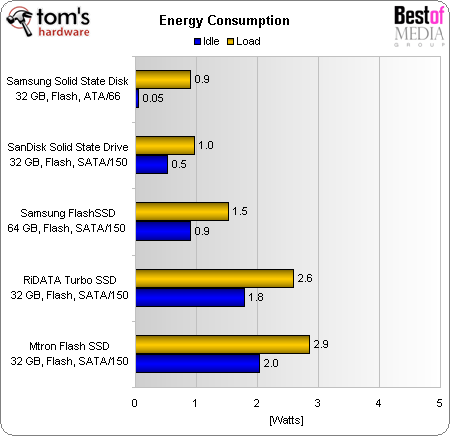Samsung, Ridata SSD Offerings Tested
Power Consumption
Conclusion
We were a bit too optimistic when we put the Ridata and Samsung drives against Mtron's 32 GB Flash SSD. The latter still is the fastest 2.5" drive we've seen, and it is fast enough to outclass any other drive - including Ridata, Samsung or Sandisk. Whether you look at throughput, I/O performance, access time or application benchmarks; Mtron dominates everywhere except in the power-consumption tests, where it requires as much as a mechanical 2.5" hard drive. However, if you want the Mtron product you'll have to spend more money on this drive, than most users would ever spend on an entire high-end PC. From this standpoint, let's look at the options.
Samsung is the first flash SSD maker who actually sent us a 64 GB model. While the other models are still limited to 32 GB, we believe that a 64 GB capacity should offer enough storage capacity for ultra-portable devices. Most people will be able to store all their applications as well as personal or business data on the drive. The visual appearance of the 64 GB Samsung drive is inspiring, especially if you compare it to the Ridata or Mtron plastic cases. Sandisk offers a similar appearance, but better throughput results as well as slower I/O performance.
If we compare the Ridata and Samsung drives to the Mtron 32 GB Flash SSD, neither is noteworthy. Mtron is so much faster - and much more expensive as well. However, we should compare the flash SSDs to conventional 2.5" and 3.5" hard drives, because this is where Flash SSDs make the most sense. Notebook hard drive performance still is 30 - 50% behind 3.5" hard drive performance, and power consumption will always be an issue. In this context, most Flash SSD provide noticeably more performance than a classic 2.5" drive based on rotating platters. At the same time, Flash SSDs offer lower power requirements.
Not all Flash SSDs are created equal. While capacities seem to be the main differentiator, performance will be even more important in the future. Mainstream Flash SSDs cannot address the issue of under-average write performance and slow random access. At the same time, high-end devices such as the Mtron SSDs are extremely expensive. At the risk of repeating myself, I want to reiterate that this is only the beginning of the flash drive era. If you can afford several hundred dollars for a tiny 32 GB Flash SSD, we recommend the Ridata, Samsung or Sandisk devices. However, their performance levels vary. Sandisk offers the best throughput, which seems attractive for desktop PCs. Ridata and Samsung offer better I/O performance, which is more suitable for server applications.
Related Articles
Mtron SSD 32 GB: Performance with a Catch
HyperDrive 4 Redefines Solid State Storage
Get Tom's Hardware's best news and in-depth reviews, straight to your inbox.
Solid State Disk Drives are Here

Patrick Schmid was the editor-in-chief for Tom's Hardware from 2005 to 2006. He wrote numerous articles on a wide range of hardware topics, including storage, CPUs, and system builds.
